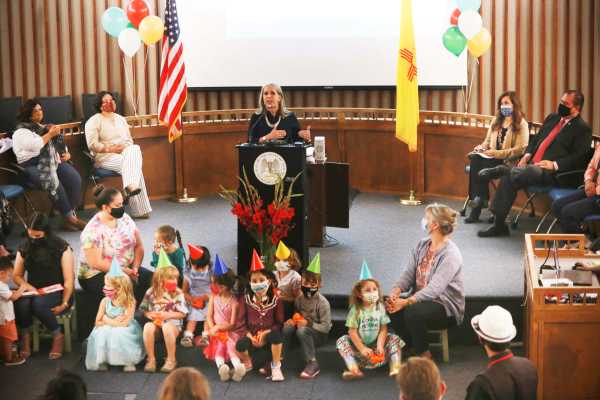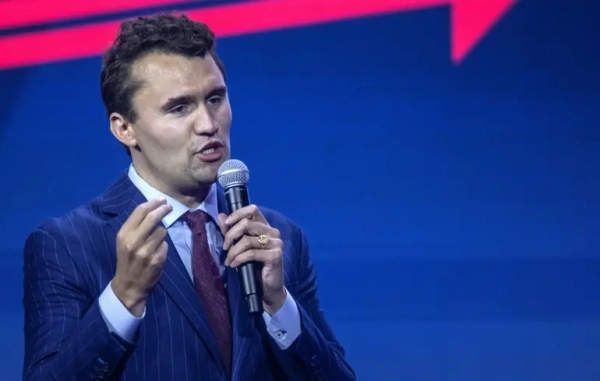
Part of The 2022 midterm elections, explained
This November, after a political fight that stretches back more than a decade, New Mexico voters are poised to approve a ballot measure that would make the Southwestern state the first in the country to guarantee a constitutional right to early childhood education.
The measure would authorize lawmakers to draw new money from a state sovereign wealth fund to provide a dedicated funding stream for universal preschool and child care, and bolstering home-visiting programs for new parents.
The unique trust fund — the Land Grant Permanent Fund — was created when New Mexico was established in 1912 and is financed by state oil and gas revenue and interest on the fund’s investments; it’s valued today at nearly $26 billion. The state constitution obligates that 5 percent of the fund be withdrawn annually to support public schools, hospitals, and universities. The amendment, if it passes, would authorize withdrawing an additional 1.25 percent annually for education, directing roughly $150 million to early childhood education and another roughly $100 million for K-12. (How exactly the money would be spent would be determined after the amendment passes.)
Voters of all political persuasions seem open to the idea: A poll sponsored by the Albuquerque Journal in August found that 69 percent of the state’s likely voters backed the amendment, and just 15 percent opposed it. Those numbers included 79 percent of Democrats, 70 percent of independents, and 56 percent of Republicans.
A more recent poll led by Public Policy Polling in October found 51 percent of voters backed the amendment, with 26 percent opposed and 23 percent reportedly unsure. Hispanic and Latino voters were the demographic most strongly in support.
New Mexico’s potential victory comes as advocates on the national level struggle to secure wins for the nation’s teetering child care system. In Congress, money for child care was stripped from Democrats’ social spending package. Parents are desperately searching for open and affordable programs today. Early childhood workers are abandoning the field for higher-paying industries. Child care jobs are down almost 10 percent compared to February 2020.
Activists in New Mexico, a state not known for its robust child welfare policy, are hoping their efforts can serve as a model for other states as well as signal to the federal government that child care is not just needed but politically popular.
“We are absolutely part of a larger network of states, and not every state has a [Land Grant] Permanent Fund, but every state has a legislature and organizing,” said Andrea Serrano, the executive director of Olé, a grassroots group in New Mexico. “We know they’re watching us to see what happens.”
Leaders are quick to say they don’t see creative state efforts as a replacement for federal help. “Ultimately, our goal is we have funding at all government levels,” said Jennifer Wells, the interim national director of economic justice for Community Change Action.
Activists spent more than 10 years working to get early childhood funding on the ballot
More than a quarter of New Mexico’s children under 5 live in poverty, one of the highest rates in the nation. The state has long ranked at the bottom of the Annie E. Casey Foundation’s national Kids Count project — an annual ranking for child well-being based on 16 indicators.
More than a decade ago, New Mexico advocates began organizing to pressure lawmakers to dedicate more funding to early childhood initiatives, inspired by these low rankings and a slew of emerging research that showed how much brain development and social-emotional learning occurs in a child’s first three years of life. Their goal was a resolution to turn the question of withdrawing more money from the Permanent Fund to voters.
Carmella Salinas, an early childhood educator in New Mexico for the past 20 years, recalls when she first learned about the organizing efforts led by Olé and got involved. “In 2012, I was still making, like, $10 an hour, I was working all the time, and I couldn’t pay my bills,” she told Vox. “Then I just heard about all these other women who had the same problems as me or couldn’t afford child care. People just believed we were babysitters, and that if you love your work, the money doesn’t matter.” Salinas began making lobbying trips, writing editorials, and speaking out.
One reason the Permanent Fund proposal has proven popular is because it wouldn’t require raising taxes.
It’s been a long fight in the state legislature. State Rep. Antonio Maestas, a Democrat from Albuquerque, told the New Mexico Political Report that in the nine years he has co-sponsored the resolution, the bill passed 25 committees in the House and went through six three-hour debates in the House. In the Senate, he said the bill received five hearings that averaged roughly 20 minutes each, and the Senate had two hours of public debate on the bill.
Serrano told Vox their biggest obstacle to getting the measure finally on the ballot was overcoming the resistance of a handful of conservative Democrats. “Year after year, they either didn’t give it a hearing or killed it in the Senate Finance Committee,” she said, referring to Democratic lawmakers like state Sens. John Arthur Smith and Mary Kay Papen, who are both no longer in office.
To surmount their resistance, progressive advocates decided in 2020 to launch what were ultimately successful primary challenges against these longstanding incumbent politicians. Progressives also waged successful challenges against other Democrats who opposed raising the minimum wage, legalizing recreational marijuana, and easing access to abortion.
“There were a handful of lawmakers who were really blocking any kind of progress in New Mexico, and once they were out of office, the early childhood measure passed and placed on the ballot,” explained Serrano.
Some Republican also lawmakers opposed the idea of withdrawing from the Land Grant, noting that the more citizens take out from the fund, the less opportunity there is for compound interest to grow on the state’s investments. As a safeguard compromise, lawmakers have included language in the ballot measure that says if the fund’s five-year average year-end market value ever shrinks below $17 billion, then the additional 1.25 percent withdrawal would stop.
If voters approve the measure, state lawmakers would next create enabling legislation to determine how the new funds would be administered. Serrano says a major priority for their group is to ensure that early childhood educators are included in that process, and to push for a career lattice for workers, with salaries that begin at $18 an hour. Many early childhood educators in New Mexico still earn minimum wage, which sits at $11.50 and will reach just $12 an hour in January.
Last year, New Mexico earned headlines when its Democratic governor, Michelle Lujan Grisham, announced reforms to make child care free for nearly all families in the state. The funding reforms — the first of their kind in the nation — were made by possible by leveraging federal Covid-19 relief funds, but those dollars will soon dry up. Advocates are framing the ballot measure this November as a necessary step to extending those accessible changes.
Advocates hope New Mexico can be a proof point for national efforts
After the Inflation Reduction Act passed the Senate without any child care provisions, a gutting blow after the House had approved a $390 billion investment in November 2021, advocates were left to glumly chart their next move.
For now, organizers are looking at appropriations and the end-of-year omnibus spending negotiations as opportunities to push for more spending on child care. One likely possibility is increasing investments in the existing Child Care and Development Block Grant (CCDBG), a federal program aimed at reducing child care costs for low-income families.
There’s already bipartisan support for increasing investments in the program, but that alone would do little to address the crisis of cost and access for middle-class families, or the notoriously low wages for child care workers.
“Our view is that state efforts on child care are positive for multiple reasons, including demonstrating to Congress the many needs that are out there for children, their families, and early learning educators,” said Averi Pakulis, the vice president for early childhood policy at First Focus on Children, an advocacy group. “However, we believe there is also an imperative for significant federal investments in our child care system, in part because it is unacceptable for only some children and families, depending on which state they live in, to have high-quality, affordable, and accessible child care.”
Erica Gallegos, the co-founder of the Child Care for Every Family Network, said her coalition — which launched about a year and a half ago — is working to build out a state and federal strategy, including one that brings much more robust and long-term investments to red states. Gallegos was once an early childhood educator herself, and involved as an activist in the New Mexico fight with Olé.
This past May, they helped organize a national Day Without Child Care to raise support for equitable access to child care and better working conditions for providers. Earlier this month, advocates also organized a national Child Care Voters Week of Action, full of events to pressure elected officials to step up on the issue.
“The fight in New Mexico is so brilliant and showcasing how you can entrench early child care as a right within the broader education system,” said Wells of Community Change Action. “We can get real wins, but we do know states can’t handle this by themselves.”
Our goal this month
Now is not the time for paywalls. Now is the time to point out what’s hidden in plain sight (for instance, the hundreds of election deniers on ballots across the country), clearly explain the answers to voters’ questions, and give people the tools they need to be active participants in America’s democracy. Reader gifts help keep our well-sourced, research-driven explanatory journalism free for everyone. By the end of September, we’re aiming to add 5,000 new financial contributors to our community of Vox supporters. Will you help us reach our goal by making a gift today?
Sourse: vox.com






